Business
Credit Bank’s CEO, Mrs. Betty Korir, Leads the Charge in Empowering Financial Services through SACCO Partnerships

In Kenya, the importance of rural access to financial services cannot be overstated. With over 5,000 Savings and Credit Cooperative Organizations (SACCOs) across the country, these institutions play a critical role in providing financial services to rural areas where access is often limited. However, SACCOs face regulatory restrictions when it comes to handling international remittances directly. To overcome this challenge, SACCOs have forged partnerships with banks, enabling their members to access remittance services. In a recent discussion hosted by Pedro DE Vasconcelos at UNON, a panel of experts shed light on the role of fintech in enhancing SACCOs’ digitalization and supporting improved remittance services at the last mile.
SASRA, the national SACCO authority established in 2008, recognizes the evolving role of SACCOs beyond savings and credit mobilization. SACCOs now offer payment solutions to their members through partnerships with various actors, particularly since they expanded their traditional bonds. Acknowledging the potential in the remittance market, SACCOs have formed partnerships with International Money Transfer Operators (IMTOs) like MoneyGram and banks. However, due to existing regulations, remittances cannot terminate directly at the SACCO level but must be processed through banks. SACCOs act as sub-agents to banks, which introduces an additional layer and can result in higher costs for remittance recipients. To address this, a project by IFAD and FSDK aims to explore ways to make this transmission more efficient and affordable, recognizing the importance of SACCOs in rural areas.
The collaboration between SACCOs and banks strategically complements each other on the ground, with a shared vision of extending financial inclusion in rural areas. SACCOs serve as vital entry points for citizens in these regions to access financial services. Several key criteria guide the selection of SACCO partners, including regulatory compliance, readiness for IT integration with fintech and banks, IT security, and liquidity management for handling inbound and outbound remittances. Moreover, SACCOs’ rich data, including sector-specific insights, prove valuable for extending credit and other financial services tailored to the unique needs and preferences of remittance-receiving families in rural areas.
This partnership presents new streams of income generation for banks while offering ad-hoc services that enhance customer loyalty and retention. It also paves the way for collaborations with other financial service providers, fostering a new generation of digital-led financial services. Although challenges exist in meeting regulatory requirements, compliance with anti-money laundering measures, reconciliation, and settlements, there is ample room for innovation and enhanced security in operations. Moreover, this collaboration encourages cooperation with other regulatory bodies to create a supportive ecosystem for rural financial empowerment.
Enabling rural access to financial services is crucial for inclusive economic growth in Kenya. SACCOs, in partnership with banks and fintech, play a pivotal role in bridging the gap and ensuring that rural communities have access to remittance services and other essential financial products. As these partnerships continue to evolve and innovate, they will empower individuals, boost local economies, and contribute to a more financially inclusive future for all Kenyans.

You must be logged in to post a comment Login